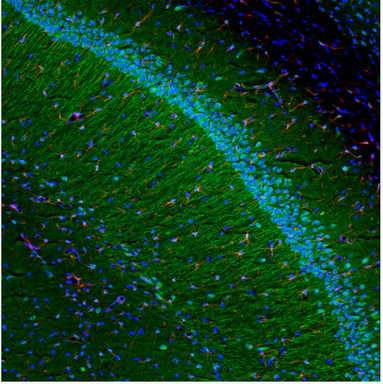Tumor necrosis factor (TNF-alpha) Rabbit Polyclonal Antibody
CAT#: PP019P1
Tumor necrosis factor (TNF-alpha) rabbit polyclonal antibody, Aff - Purified
Specifications
| Product Data | |
| Applications | ELISA, FN, IHC, WB |
| Recommended Dilution | Neutralization: To yield one-half maximal inhibition [ND50] of the biological activity of Mouse TNF-alpha (0.5 ng/ml), a concentration of 0.010-0.015 µg/ml of this antibody is required. Indirect ELISA: To detect Mouse TNF-alpha by indirect ELISA (using 100 μl/well antibody solution) a concentration of 0.5-2.0 μg/ml of this antibody is required. This antigen affinity purified antibody, in conjunction with compatible secondary reagents, allows the detection of at least 0.2-0.4 ng/well of recombinant Mouse TNF-alpha. Sandwich ELISA: To detect Mouse TNF-alpha by Sandwich ELISA (using 100 μl/well antibody solution) a concentration of 0.5-2.0 μg/ml of this antibody is required. This antigen affinity purified antibody, in conjunction with a Biotin conjugated antibody (Cat.-No PP019B) as a Detection antibody, allows the detection of at least 0.2-0.4 ng/well of recombinant Mouse TNF-alpha. Western Blot: To detect Mouse TNF-alpha by Western Blot analysis this antibody can be used at a concentration of 0.1-0.2 µg/ml. Used in conjunction with compatible secondary reagents the detection limit for recombinant Mouse TNF-alpha is 1.5-3.0 ng/lane, under either reducing or non-reducing conditions. Immunohistochemistry: This antibody stained colchicine injected mouse brain (hippocampus CA1 region) tissue. The primary antibody was incubated at 1.0 μg/ml overnight at 4°C. This was followed by a peroxidase conjugated secondary antibody and then a fluorescein Tyramide Signal Amplification (TSA™) reagent. Optimal concentrations and conditions may vary. Information and photo are courtesy of the Tissue Profiling group, SciLifeLab Stockholm. |
| Reactivities | Mouse |
| Host | Rabbit |
| Clonality | Polyclonal |
| Immunogen | Highly pure (>98%) E.coli derived recombinant Mouse TNF-alpha (Cat.-No PA031). |
| Specificity | Reacts with Mouse TNF-alpha. Other species not tested. |
| Formulation | PBS, pH 7.2 State: Aff - Purified State: Lyophilized (sterile filtered) purified Ig fraction |
| Reconstitution Method | Centrifuge vial prior to opening. Restore in sterile water to a concentration of 0.1-1.0 mg/ml. |
| Purification | Affinity Chromatography employing immobilized MouseTNF-alpha matrix |
| Background | Tumor Necrosis Factor (TNF) is a cytokine whose function is mediated through two distinct cell surface receptors (TNF Receptor I and TNF Receptor II) that are included in the TNF receptor superfamily along with FAS antigen and CD40. TNF receptors I and II are membrane glycoproteins and they are from the family of cell surface molecules including nerve growth factor receptor, Fas/Apo1, CD30, OX40, and 4-1BB, which are characterized by cysteine rich motifs in the extracellular domain. TNF Receptor II (p75, CD120b) is present on most cell types (including monocytes, endothelial cells, Langerhans cells, and macrophages) and is considered to play a role in cell stimulation by TNF alpha. TNF Receptor II molecule is shown to be responsible for stimulation of activated T lymphocytes by TNF alpha. |
| Synonyms | TNF, TNF-a, TNFA, TNFSF2, Cachectin |
| Reference Data | |
Documents
| Product Manuals |
| FAQs |
| SDS |
{0} Product Review(s)
0 Product Review(s)
Submit review
Be the first one to submit a review
Product Citations
*Delivery time may vary from web posted schedule. Occasional delays may occur due to unforeseen
complexities in the preparation of your product. International customers may expect an additional 1-2 weeks
in shipping.






























































































































































































































































 Germany
Germany
 Japan
Japan
 United Kingdom
United Kingdom
 China
China



